Experimental mission for the prevention of rental evictions: Review 2020 - 2021
Loire-Atlantique Department
June 2021
Agence Nationale pour l’Information sur le Logement (ANIL)
From a policy aimed at preventing public order problems, eviction prevention policy has gradually adopted a preventive approach that includes social support for households. Today, it is based on a socio-legal approach, as demonstrated by the « mobile teams » scheme, part of the third inter-ministerial eviction prevention plan. The aim of this scheme is to develop an « outreach » approach to households unknown to the social services, by mobilising a pair of legal advisors and a social worker.
The ADIL network plays an active role in prevention by answering tenants’ and landlords’ questions about rent arrears and evictions: 45 « crisis exit » officers cover 55 départements and 14 ADILs are part of the mobile teams. These measures provide a new framework for defining and implementing local strategies to prevent eviction and offer an opportunity to structure this policy. In Loire-Atlantique, an experimental eviction prevention mission was carried out between October 2020 and May 2021. This experiment enabled profiles to be drawn up, contacts and partnership working to be improved, and new prospects to be outlined.
To download : adil44_rapport_d_activite_pex_2020-2021.pdf (4.9 MiB)

Assessment
« The aim of preventing evictions is to prevent people from being made homeless and the resulting social, occupational and health problems. The aim is to ensure that tenants who are able to pay their rent are kept in their homes and that those who are no longer able to do so are rehoused, by means of early, concerted socio-legal, financial and medico-psychological support tailored to each situation ».
I- Introduction
In this context, the DDETS has piloted an experimental scheme to support households threatened with eviction to stay in or find new accommodation from October 2020.
Target groups
This scheme applies to tenants threatened with eviction living in the Loire-Atlantique department.
Two types of public are targeted:
-
Tenants in private and social housing for whom the assistance of the police has been granted. Following government directives linked to the health crisis in 2020, this assistance has been suspended.
-
Tenants in private and social housing for whom the requisition of the police force has been requested by the landlord and for whom the follow-up is being studied.
Situations were divided between ANEF FERRER and ADIL during 4 restricted CCAPEX meetings led by the State services. Households in a very fragile situation were referred to ANEF FERRER in order to limit the number of people to contact.
Implementation of the scheme and objectives for situations referred to ADIL
The scheme provides for the implementation of four actions carried out by the ADIL’s « eviction prevention » officer:
-
Making contact with the tenant
-
Assessing and carrying out a social and budgetary diagnosis
-
Recommendations, accompanied by the resumption of payments wherever possible
-
Implementation of individual support, if required, by ANEF-FERRER or by the general law.
The social diagnosis makes it possible to assess the situation of the households and to define the necessary recommendations to ensure that they remain in their accommodation or are rehoused in a suitable home. Both actions are part of an « outreach » approach. As far as possible, the interviews are carried out in the home.
To support the diagnosis and therefore the social assessment, the project officer collects all the information on the tenant’s situation from the partners, by telephone or email. Exchanges with the social workers also enable the ADIL to liaise with the tenant to encourage contact.
Steering and coordination
The scheme is managed by the DDETS eviction prevention unit. We studied between 25 and 35 cases per restricted CCAPEX, once every two months. Four restricted CCAPEX meetings were held during this experimental phase.
Based on the diagnoses provided, the eviction prevention unit examines the recommendations for support measures.
Finally, it is planned that the ADIL will act as an interface with the ANEF-FERRER when a situation requiring support is referred, through tripartite meetings.
Review of this experimental phase
I- Quantitative data for the period from 1 October 2020 to 31 May 2021
109 cases were referred to the Loire-Atlantique ADIL. 54% of cases were diagnosed, including 22 in the private sector and 37 in the public sector, i.e. 59 cases. Across all housing types, 17 independent tenants refused support, 18 cases were referred to mainstream services and 24 cases were referred to Anef-Ferrer, a non-profit association based in Nantes, whose aim is to help the most disadvantaged people to overcome their difficulties thanks to a team of qualified employees.
7 summaries were produced following a telephone conversation, all the others were produced after a meeting and discussion.
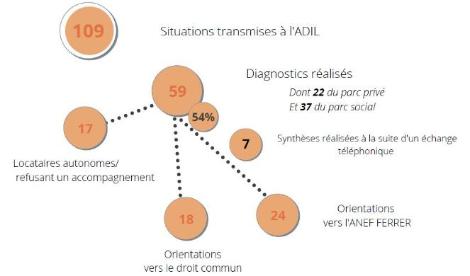
Household profile - private housing
The typical profile of a private-sector tenant affected by eviction proceedings and referred to ADIL is a man aged between 46 and 60 who is divorced or separated. Most of the private tenants we met were in receipt of minimum social benefits such as RSA or AAH.

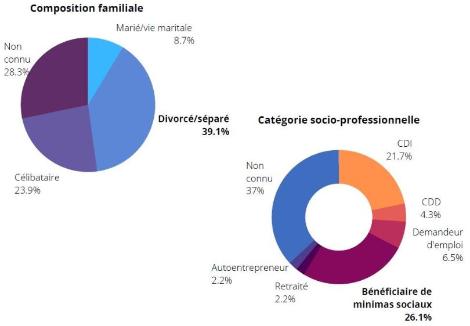
Household profile - public housing
The typical profile of a social housing tenant affected by eviction proceedings and referred to ADIL is a man aged between 31 and 45 who is divorced or separated. Most of the social housing tenants we met had permanent contracts or were receiving minimum social benefits. We note a balance between these socio-professional categories.
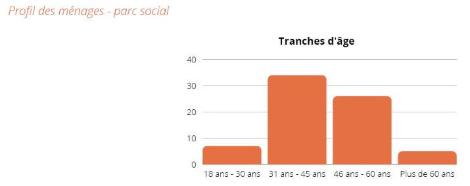
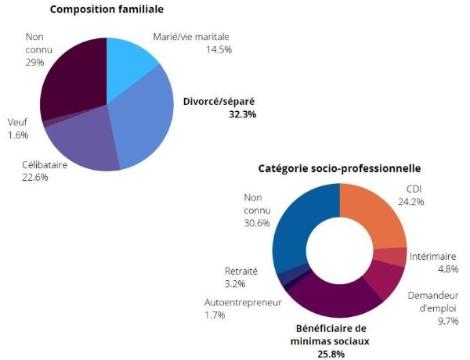
Common elements in the situations we encountered
We can see that the socio-professional category of the tenants met by ADIL from social housing and private housing is similar. There are similarities between social housing and private housing tenants, such as family composition. A large proportion of the tenants we met were separated or divorced. This family event can destabilise the household’s financial situation and administrative management, and have an impact on staying in the home.
In some cases, the spouse who has left the family home was the person responsible for administrative and financial management. This is why, in such situations, support from ANEF FERRER is recommended so that the tenant can re-appropriate the concepts and reflexes of economic life.
Among the households interviewed, the difficulties leading to rent arrears were mostly related to fixed expenses not being in line with monthly income due to a change in family and/or professional situation.
II - Communication methods
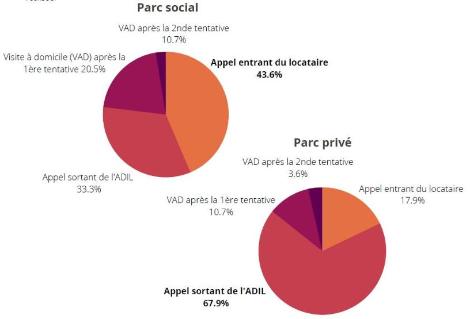
Methods of contact
Once a situation has been referred to the ADIL, the project manager initially contacts the tenant by post.
Either the tenant makes contact directly by telephone, or a follow-up call is made.
In the case of social housing tenants, we note that the majority contacted ADIL as soon as they received the first letter making the information available, within a maximum of one week. In contrast, 68% of tenants in private housing had to be contacted by telephone in order to get in touch. This can be explained by the work carried out in advance by the social landlord’s legal department, in particular the attempts to contact them, and the neutrality of the ADIL. The fact that eviction is imminent may also explain this responsiveness.
The proposals for meetings made by letter are also efficient in terms of the « Going Towards » principle. In fact, following receipt of this letter, some tenants called the ADIL back and asked to postpone the proposed appointment, while others said they were « waiting for us to come » and were « relieved ».
The second attempts to visit the tenants’ homes without sending a letter beforehand resulted in two tenants being met. These were people who were very isolated, both in terms of their families and friends and in terms of their administrative affairs, and who were in poor health. The tenants said they were very discouraged and thought eviction was inevitable.
Sharing information with other organisations
In the context of the confidentiality of user data and in the absence of clearly established processes during this experimental period, the sharing of information with other players involved in the households’ situation may have been an obstacle from time to time, particularly in the context of professional confidentiality. However, on the whole, the exchanges with the partners enabled us to obtain information about the household’s situation, as well as an understanding and in-depth analysis of the situation.
This also made it easier to make contact with the tenants.
Explaining this mission and reminding tenants and partners of the need for confidentiality facilitated the interviews.
Diagnosis based on declarations
With the aim of recreating a bond of trust, the interviews were carried out on a declarative basis, and tenants were free to provide us with supporting documents. Some tenants may withhold certain information, which may influence the recommendations made. Information provided after the meeting may call into question the initial orientation. The social diagnosis is then updated. Exchanges with partners can sometimes help to clarify certain aspects of the situation.
The monthly budget is also drawn up on the basis of declarations. Assessing the ability to provide details of fixed costs also helps to guide recommendations.
III - Partnership working
Within ADIL
The project manager has requested support from the legal department for certain situations relating either to tenants or private landlords. The main issue is non-payment of rent in the event of disputes between tenant and landlord. In addition, following an appointment at the home where an application for social housing had to be made, the project manager contacted the social housing advisers at the Espace Habitat Social.
Outside ADIL
Partnerships have mainly been established with the Espaces Départementaux des Solidarités (EDS), the Centres Communaux d’Action Sociale (CCAS) and associations. Further afield, links have also been developed with the Caisse d’Allocations Familiales (CAF), the Union Départementale des Associations Familiales (UDAF) and the bailiffs in charge of cases.
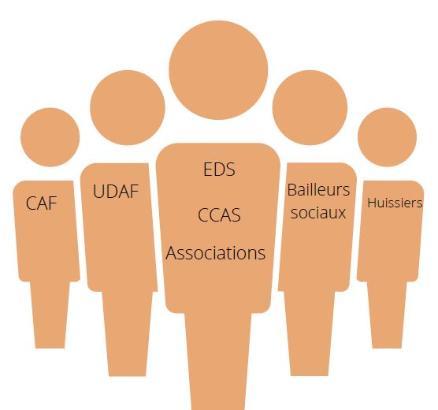
IV - Conclusion
Following on from the first mission carried out in 2019 with tenants in private housing who had been served with a summons to pay, this new experimental mission has enabled us to capture more than half of the households referred by the government services. It should be noted that these households had not responded to any of the previous requests. In some cases, this made it possible to establish a link with a social worker, to start the process of rehousing or maintaining housing and to consider solutions to the household’s debts. In a few cases, rent payments were resumed, often in part, following the first or second meeting. Depending on the stage of the procedure and the amount of the rent debt, our recommendations have regularly included filing for overindebtedness. The partnership with ANEF FERRER and all the other partners mentioned in this report has enabled us to coordinate our actions. In addition, the shared viewpoints of the social workers from ANEF-FERRER and ADIL have also enabled a more detailed analysis of the most complex situations. It is also important to mention the value of home visits in assessing the household’s ability to live independently. During these visits, we offer tenants a tour of the home in order to assess the investment in the home, the maintenance of each room and/or any problems within the home:
-
Hygiene
-
Condition of walls, floors, electrical sockets, etc.
-
Housing adapted to family composition, disability and health.
One observation to bear in mind: we can see that households find it easier to be physically and psychologically available in an environment they know.